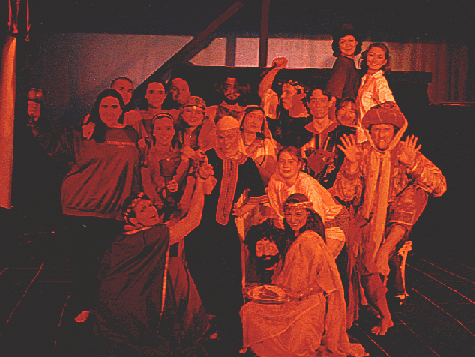
Please visit http://www.christianfantasy.net/admg/ for recent news.

| The French Butler | Salomé | Links | Biography: Theatre |

Look out! She's got her meddling hands out again!...
Uh-oh. You got the director up on the stage!...
From the top!...Places!
...Five minutes, thank you....Lighting cue 20 warned....
No, no, no, try to speak like Julia Child; sing Wagnerian!
...Look at the moon *gack*....House open....
*Applause*
Ah, the dulcet sounds of the theatre.

| The French Butler | Salomé | Links | Biography: Theatre |
As a Drama Major at Franciscan University of Steubenville, I've had the wonderful opportunity to direct two plays, The French Butler ~ An Evening's Diversion by me, and Salomé by Oscar Wilde. Two radically different plays, two radically different experiences - neither of which I'd trade.
On this page, you can see what madness brought me to attempt each, with corresponding links further on to the pictures (beware - those pages may load slowly).
Anybody who was in those shows are more than welcome to download the pictures and thereby brave recurring nightmares, and spastic reiteration of various and sundry random lines.
Oh! And if you're looking for the Anathan Song...*snicker*...click here.
The French Butler ~ An Evening's Diversion had its humble beginnings in boredom (or ennui, more precisely). In the middle of my Junior year of High School, I realised that I wasn't being challenged enough (never mind the number of classes and extracurricular activities, "not challenged enough" is a common complaint of obsessive compulsives who are also left-handed!), and so applied to my English teacher for an Independent Study. A friend of mine (and fellow co-editor of every publication they'd allow us to be on) who shared my mental restlessness (despite her right-handed handicap), joined in and soon we three settled upon the following course of action.
Over the next two quarters (approx. a month and a half in length, so three months all together), we would each choose two authors, read their greatest work, research their lives and criticism on their work, and write a report examining each author's worldview and how their work exemplified that worldview. Then, just because these were the myopic, word-bound girls we were...um, are...we would also write a short story in the author's style. I chose Émile Zola and Oscar Wilde, the latter of which naturally produced The French Butler.
Kristen: "Hi, Em. Yeah, me too."
Emily: "I cannot for the life of me figure out what to do with them next."
Kristen: *clack clack clackity clack clack* "Dang!"
Emily: "How in the world do I.... What's that?"
Kristen: "It's straw! It's all straw!"
Emily: "Who's idea was this again?"
Kristen: "Yours." *mumblegrumble* "How'd you like to be married to a French Opera singer?"
Emily: "Is he a tenor or a bass?"
Kristen: "Baritone."
Emily: *considering whilst scrolling aimlessly up and down the screen* "Baritones are good."
Kristen: "I hate Jane Austen."
Emily: "I hate Oscar W...wait a minute...! If I...."
Kristen: "Hold on a sec, Em, your character's finally talking."
Emily: "Gotta run, I think I know what I'm doin...."
Kristen: *click*
So you see how well we collaborate. Naturally, each of our stories were written in due time, and mine revised in due time, to finally tell the charming, and "quite useless" tale of Philip Higgins, who, in order to gain the hand of the fair Madeline, agrees to her guardian's, Mr. Richard's, demand that he "find some form of employment other than [Mr. Richards]." Finding himself promptly fired, and learning that his friend's, Arnold's, Aunt Davis has lately informed her nephew that he is giving a dinner party - and, further, that she has just fired his butler, decides to take up Arnold's rather unique employment opportunity.
Unfortunately, once he arrives at Arnold's, he discovers that not only is Aunt Davis' Butler-Loving protégée, Emma Delamonde, in very interested attendance, but that his former employer, Mr. Richards, and his would-be fiancée, Madeline have also come. A spur of the moment scheme is concoted, and Arnold introduces Philip as "Philippe Heegeens," his new French Butler. Everyone accepts this ridiculous statement with aplomb - for Aunt Davis is interested in the widowed Mr. Richards, Philip's newfound nationality only piques Emma's interest, and Arnold is too busy taking notes for his latest novel. But Madeline, who, since it is the fashion, has suspected Philip of infidelity, breaks off all engagements with Philip half-way through the party, leaving Aunt Davis to remark, "Now we are short one dinner guest again! Whatever shall we do?"
The next morning, Philip returns to Mr. Richards, to return his borrowed clothes to the actual butler, Henry. Henry, ever with an eye for self-improvement, offers his serviced in winning back Madeline, and stuffs Philip beneath the couch. Madeline enters, still in raptures over her lost love, when Arnold comes in, elated over his success in converting the previous night's debacle into, "the best piece of fiction [he's] ever written." Before they can celebrate, however, Mr. Richards and Aunt Davis waft in and proclaim that they are engaged - and more, that everything they have ever done before is now to be forgot...including Philip's rather abrupt dismissal from Mr. Richards' employ. Henry reveals Philip, and sidles off himself with Emma, followed by the glowing older couple. Thus Philip at last proposed and is, in turn, accepted, with Arnold's closing remark, "And thus ended their love affair, in a rather tragic and ordinary manner."
Clockwise from top: Arnold Davis, Emma Delamond and Henry, Madeline Applebaum and Philip Higgins, Aunt Ethyl Davis and Mr. George Richards. To see the larger picture, click on the photograph. To return, press the "Back" button on your browser. To see more French Butler pictures, click here.
In Paris, Philip, the hero and sometime "French Butler" is Philippe, the painter, who doesn't get the girl. Arnold, the dandy, is Armand, the author, who has and keeps the girl. Madeline is Madeline, but instead of the perky ingénue, she's Armand's rather downtrodden mistress. Conversely, Madeline's guardian, Mr. Richards, is M. Richard, the landlord, who accepts Madeline's proposition as payment for the rent. And Arnold's Aunt Davis is M. Richard's sickly wife, who is sure that her - until the end of the story - faithful husband is having affairs left and right! (A far cry from Mr. Richards' late, lamented wife in The French Butler who, "Treated everyone as if they were her husband" while Mr. Richards continued on oblivious.) Emma Delamonde, Aunt Davis' protégée with an eye for matrimony, is the little maid who closes the door on Madeline. And Henry, the Butler is...well, Henri, the Butler. (Overall, I think I prefer the lighthearted Oscar to the rather down-and-out Émile...but then again, there's a place for each, eh?)
The production isn't anything near what I would do now with it - for one most of the blocking was static and the set was lopsided - but it was a terribly interesting experience, and, more than anything, it was fun. OK - well, maybe it wasn't a barrel of laughs when my Arnold quit on me and I had to promote my butler to Arnold who had to learn umpteen speeches in two weeks, and then search frantically for a Henry, singing to myself, "Possibly she won't go down;/possibly she'll stay afloat./Possibly all this will come to an end/On a positive note," from Titanic...but it was fun.
Salomé has a much shorter story, but quite as intense. A wonderful sermon I recently heard, commented on the many facets of each person's personality, and how, while one person may be able to love this facet of someone, and this person two or three facets, only God can love every single aspect of a person. This struck me and I realised that at times, we attempt to make ourselves a single face, and present this to the world - as though this were all we would present to Our Creator. But for the artist, whose very means of communication is public, those many facets are explored for not only Our Lord, but also for the World to see. Now, this is not a plug for voyeurism or exposition at all - there's a reason why one doesn't air dirty laundry on main street. Dirty laundry is for the confessional. But it does explain why the author of The Importance of Being Earnest could then turn around and write Salomé. And, at the risk of too much egoism and pop-psychology, it explains why I chose something very like Earnest to begin with, and then turned around to work on the completely different, Salomé.
Each Senior Drama Major at FUS is required to produce/design/direct/etc. an one-act play. We begin searching for the play, however, in our Junior year. Well, I'd just returned from Austria the semester that we were plunged into the wild world of directing, and - I'm afraid to say - I must have left all my willpower and focus somewhere in the Alps (with Sven, no doubt), so needless to say I didn't put my all into finding an one-act. Of course, this was also compounded by the abysmal lack of decent one-acts out there. Most of them are frivolous, or wrap-up too quickly, or have casts of twenty! I had settled, finally, on a play by Anouilh, which was a comedy very much like French Butler. However, my professors, in their wisdom, urged me to find another play - something that had a semblance of meaning; something I could get truly excited about. So that summer I spent reading more awful one-acts, until finally I stumbled upon my good old friend Oscar, again.
(For those unfamiliar with Salomé, it's the story of a Princess of Judea who falls in love with John the Baptist, dances for Herod, the Tetrarch, and then asks for the Baptizer's head on a silver platter. It's mentioned briefly in the Bible, and Wilde's version is a very loose adaptation [since Biblically it was Herodias, Salomé's mother, who told Salomé to ask for the head, and there was no romance between Salomé and anybody]. But lovey-dovey stuff is far more dramatically interesting!)
Soon after, I submitted my initial work to my professors who approved the play, and in the Spring of '99, I began intense work on the project. I chose music, and costumes. I applied to my architect cousins and uncle for tips on building a winding staircase. I agonised over how to build Jokanaan's (John the Baptist's) severed head. I spent hours in my room with a veil dancing to Orff's Carmina Burana. Heck, I even - rather guiltily - looked up bellydancing on the web (there's actually quite a lot of information on it, I found!). In my madness to create the best show possible, I sucked my household sisters in with me, and soon they were going around wide-eyed, coming up to me with jewelery and scarves and golden cups saying, "I saw this at a garage sale! We could use it!"
Front Row: Herod and Herodias, with Jokanaan's Head. To see the larger picture, click on the photograph. To return, press the "Back" button on your browser. To see more Salomé pictures, click here.
My poor actors (mea culpe, all!), were wonderful. And wonderfully patient...and pliant. I attempted to keep them in the world of the play from the very beginning, by reading through with all of us reclining on the floor. Sometimes it worked, soemtimes it didn't (I can still remember all of them laughing their heads off the first time we staged the Young Syrian's death. I attempted to sober them up by asking them how they would react if that happened out of nowhere in the cafeteria - which question helped some, and brought a frightening gleam to my actor's eyes as they said, "Could we do that in the caf?" I said, sure, but I don't think they ever did). I had to bring the girl who played Salomé a very long way, repeating to her the mantra my professor kept saying to me, "If we'd wanted to do Mary Poppins, we would have, but this is not Mary Poppins...can you look more seductive there?" Rebecca did a superb job. My poor Herod had more than two-and-forty speeches, including the nefarious "Peacock" speech. He also had to preform an epileptic fit, be the most vile creature in town, and not trip on his costume. Need I say how incredibly well he did? The entire audience shuddered each night he stalked up after Salomé and said, "I command thee to DANCE!...Salomé." *ugh* My Herodias, who had just the semester before been Emily in Our Town, really brought to life the conflict between the aging bitter queen, the daughter of Babylon, and the mother. I could go on and on about how great my cast was - every single minor character made a life for themself, even the first Guard who came to the production late as a substitute (I seem to have a thing about losing one actor per play) - but space contrains me.
My crew was fantabulous as well. The "Lightning Slave" who worked the strobe, the two "Condiments" who managed to bring on and off set pieces despite actors lying in their way, my wonderful roommate who ran sound and so underscored the entire play, my lighting tech who had near to a hundred cues, and of course my stage manager who remained calm in the face of battle (and kept me from throttling a few actors towards Hell week).
On the happy side, I've posted a ton of pictures, including renderings, which you can view here. Also, because of that silly play (and because the other two plays that semester were also tragedies - one of them the retelling of the Oedipus Myth!), I ran away from incest by immersing myself in Jane Austen's Pride and Prejudice, which drew me to the Republic of Pemberley, and from there to write Not All Wealth is Bought With Gold.

An Evening's Diversion Humble Beginnings
Humble Beginnings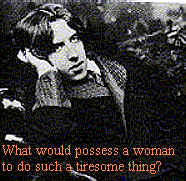 The play itself was written in one night. I'd done my reading, and written my paper, but the play had yet to be done. I knew that I wanted to use basically the same seven characters from my Zola story (see next paragraph), the better to see how environment/style affects the same crew, but beyond that I'd no idea. From reading Wilde's The Picture of Dorian Gray (including Chapter 11 - the infamous "Dust Mote" laundry list), and The Importance of Being Earnest, I had gleaned some basics of his style. For example, he always had at least one dandy character in his plays, an Aunt is often to be found somewhere (after reading more British comedy, however, I've come to the conclusion that the English have something against Aunts in general), and characters spoke either in witty speeches, or witty couplets/triplets (i.e., Arnold: "Misery loves company." Madeline: "And the lack of company loves misery!"), but as for a plot, I'd no idea. Fortunately, my fellow scholar was also in the middle of agonising over her project (I think she'd chosen Jane Austen and was attempting a modern day marriage fest which, as far as I recall, included all of our friends as characters, and had me marrying an Opera singer in France), and so late late late at night we called each other frantically back and forth on the phone in conversation, like so:
The play itself was written in one night. I'd done my reading, and written my paper, but the play had yet to be done. I knew that I wanted to use basically the same seven characters from my Zola story (see next paragraph), the better to see how environment/style affects the same crew, but beyond that I'd no idea. From reading Wilde's The Picture of Dorian Gray (including Chapter 11 - the infamous "Dust Mote" laundry list), and The Importance of Being Earnest, I had gleaned some basics of his style. For example, he always had at least one dandy character in his plays, an Aunt is often to be found somewhere (after reading more British comedy, however, I've come to the conclusion that the English have something against Aunts in general), and characters spoke either in witty speeches, or witty couplets/triplets (i.e., Arnold: "Misery loves company." Madeline: "And the lack of company loves misery!"), but as for a plot, I'd no idea. Fortunately, my fellow scholar was also in the middle of agonising over her project (I think she'd chosen Jane Austen and was attempting a modern day marriage fest which, as far as I recall, included all of our friends as characters, and had me marrying an Opera singer in France), and so late late late at night we called each other frantically back and forth on the phone in conversation, like so:Emily: "Kristen? Aaaarugh!"
 Synopsis
Synopsis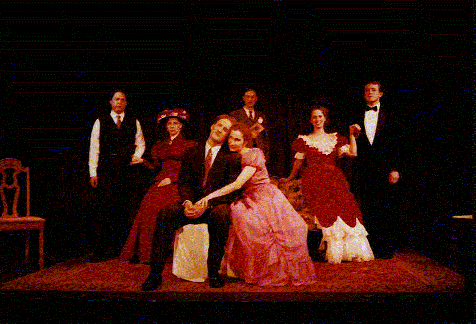
Curious little NAQ (Never Asked Question): the seven cast members of The French Butler have exact counterparts in my Émile Zola-look alike story (which was never properly titled beyond Kristen's critical remark, "Oh, it's La Bohème pays the rent!").
 Production
Production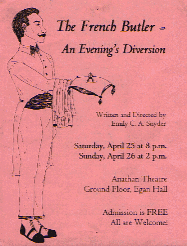 Anyway, come four years later in my Junior year in college, a fellow theatre major, and I were thinking of doing a scene for the Fine Arts Festival and so were reading every play we could get our hands on to find a scene that wasn't from Mourning Becomes Electra. At some point I suggested looking at this play I had written, and within a few hours we'd called up her boyfriend, my household brother, and we were all giggling and taking parts. Either it was the wine or it was the hour (and my bet's on the latter since the former was non-existant), but by the time the dorm closed and all men were kicked out, we were seriously thinking about putting this silly thing on! Well, this came to that, my roommate suggeted the title, my professor dubiously agreed to allowing it, we lost actors, got actors, lost hair and broke legs, and finally The French Butler went up for two wonderful nights.
Anyway, come four years later in my Junior year in college, a fellow theatre major, and I were thinking of doing a scene for the Fine Arts Festival and so were reading every play we could get our hands on to find a scene that wasn't from Mourning Becomes Electra. At some point I suggested looking at this play I had written, and within a few hours we'd called up her boyfriend, my household brother, and we were all giggling and taking parts. Either it was the wine or it was the hour (and my bet's on the latter since the former was non-existant), but by the time the dorm closed and all men were kicked out, we were seriously thinking about putting this silly thing on! Well, this came to that, my roommate suggeted the title, my professor dubiously agreed to allowing it, we lost actors, got actors, lost hair and broke legs, and finally The French Butler went up for two wonderful nights.
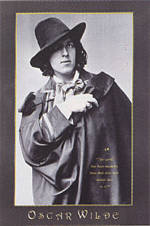 I had read Salomé four years previously when I was researching for my Independent Study, but hadn't thought much of it then beyond, "Whoa. This Salomé chick is flipped out." Rereading it, though, the rhythm of the words enticed me, the sheer staging of such a beast intrigued me - and, most importantly, I saw in Salomé the template for oh so many girls I had known who had loved others as objects because they had been taught no other love.
I had read Salomé four years previously when I was researching for my Independent Study, but hadn't thought much of it then beyond, "Whoa. This Salomé chick is flipped out." Rereading it, though, the rhythm of the words enticed me, the sheer staging of such a beast intrigued me - and, most importantly, I saw in Salomé the template for oh so many girls I had known who had loved others as objects because they had been taught no other love.
Second Row: The Slave Manasseh, Lisa my Stage Manager, and the Cappadocian
Third Row: me, Krissy a Condiment/Crew, the Page Erzebet, Salomé, and Guard 2.
Back Row: Brent the Lightning Slave, Marissa the Condiment/Crew, Guard 1 Namaan, Jokanaan, The Young Syrian Narraboth, Theresa the Sound Queen.
Towering Over All: Angie the Light Wonder and Sue the House Commadant.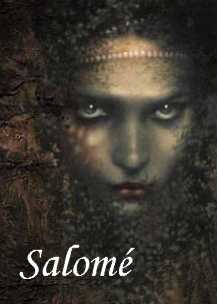 Great thanks go out to the audience, as well. Anathan Theatre is perhaps one of the world's worst theatres in terms of space...i.e., it doesn't have any. No sidestage, no backstage, no flyspace, no nothing. However, this squished arrangement allows for ingenuity - and for great audience/actor relations. My Guards enjoyed waiting silently behind the audience to startle them half to death when they bellowed, "Hail, Caesar!" Salomé entered through the audience, and several nights the audience responded by whispering to their neighbor, "I'm sitting next to Salomé! I can't believe it! Wow! Neat!" Every night, Herodias called upon the audience to witness Herod's rash vow to give Salomé anything she desired. And each night the audience reacted vocally to everything that went up on the stage - squirming in their seats, calling out, "Scum!" to Herod, tittering at Salomé's failed attempts to win Jokanaan, tearing up at the Page's lament for the Young Syrian, and so on and so forth. The first night, as I watched the audience watch my play in fascinated horror, I nearly wanted to bound out of my seat, stop the play and yell, "I'm sorry! I'm SO sorry! Go home, watch something happy!" But I realised that their horror was the reaction I wanted. If the audience was not horrified as such an act as Salomé's, if they didn't leave that theatre vowing to never act like her, if it instilled in the audience any horror for sin - then that is the effect I wanted, as painful as it might be.
Great thanks go out to the audience, as well. Anathan Theatre is perhaps one of the world's worst theatres in terms of space...i.e., it doesn't have any. No sidestage, no backstage, no flyspace, no nothing. However, this squished arrangement allows for ingenuity - and for great audience/actor relations. My Guards enjoyed waiting silently behind the audience to startle them half to death when they bellowed, "Hail, Caesar!" Salomé entered through the audience, and several nights the audience responded by whispering to their neighbor, "I'm sitting next to Salomé! I can't believe it! Wow! Neat!" Every night, Herodias called upon the audience to witness Herod's rash vow to give Salomé anything she desired. And each night the audience reacted vocally to everything that went up on the stage - squirming in their seats, calling out, "Scum!" to Herod, tittering at Salomé's failed attempts to win Jokanaan, tearing up at the Page's lament for the Young Syrian, and so on and so forth. The first night, as I watched the audience watch my play in fascinated horror, I nearly wanted to bound out of my seat, stop the play and yell, "I'm sorry! I'm SO sorry! Go home, watch something happy!" But I realised that their horror was the reaction I wanted. If the audience was not horrified as such an act as Salomé's, if they didn't leave that theatre vowing to never act like her, if it instilled in the audience any horror for sin - then that is the effect I wanted, as painful as it might be.
 Top
Top


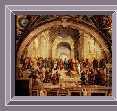

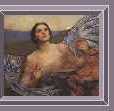 (c) 1998, 1999
(c) 1998, 1999
Updated 13 June, 2000
All Rights Held by the Author.
No part of these pages may be used or copied without express permission of the author.
